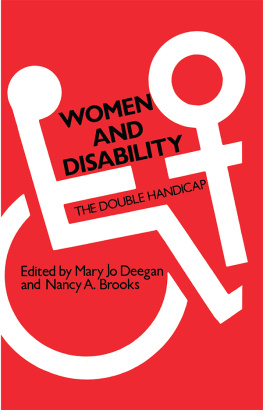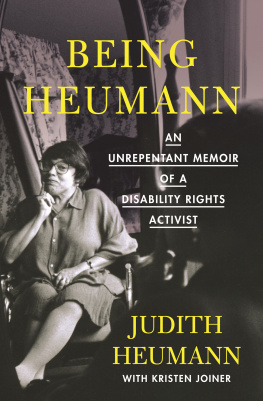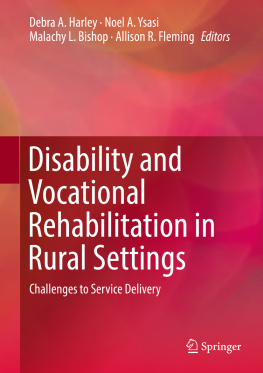
Controversies and Disputes in Disability and Rehabilitation
Although the field of disability services and societal understanding of disability issues have advanced in recent decades there remain controversial subjects and unresolved disputes. These cover a wide spectrum from legislation impacting the entire disability community such as the ADA, to culture clashes within a minority group such as the deaf community. Experts analyze and discuss nine of these controversies of particular interest to professional social workers. They are ones about which there are obvious disagreements and no readily available solutions. All sides of the issues are examined to enable readers to draw their own conclusions. The overall intent is to draw attention to each controversy and to motivate professional social workers to engage in personal as well as public dialogue about them.
This book was originally published as a special issue of the Journal of Social Work in Disability & Rehabilitation.
Roland Meinert, now retired, was Professor and Director of Schools of Social Work at Michigan State University and the University of Missouri, USA. His book and journal publications cover a wide range of topics including mental health, administration, policy, education and others. He was formerly co-editor of the Journal of Social Development Issues.
Francis K. O. Yuen is Professor at the Division of Social Work at California State University, Sacramento, USA. He has published in the areas of family health social work practice, program evaluation, disability and services to refugees and immigrants. He is the editor of the Journal of Social Work in Disability & Rehabilitation.
Controversies and Disputes in Disability and Rehabilitation
Edited by
Roland Meinert and Francis Yuen
First published 2012
by Routledge
2 Park Square, Milton Park, Abingdon, Oxon, OX14 4RN
Simultaneously published in the USA and Canada
by Routledge
711 Third Avenue, New York, NY 10017
Routledge is an imprint of the Taylor & Francis Group, an informa business
2012 Taylor & Francis
This book is a reproduction of the Journal of Social Work in Disability and Rehabilitation, volume 9, issue 2-3. The Publisher requests to those authors who may be citing this book to state, also, the bibliographical details of the special issue on which the book was based.
All rights reserved. No part of this book may be reprinted or reproduced or utilised in any form or by any electronic, mechanical, or other means, now known or hereafter invented, including photocopying and recording, or in any information storage or retrieval system, without permission in writing from the publishers.
Trademark notice: Product or corporate names may be trademarks or registered trademarks, and are used only for identification and explanation without intent to infringe.
British Library Cataloguing in Publication Data
A catalogue record for this book is available from the British Library
ISBN13: 978-0-415-69857-3
Typeset in Times New Roman
by Taylor & Francis Books
Disclaimer
The publisher would like to make readers aware that the chapters in this book are referred to as articles as they had been in the special issue. The publisher accepts responsibility for any inconsistencies that may have arisen in the course of preparing this volume for print.
Contents
Roland Meinert
Howard Karger and Steven R. Rose
Romel W. Mackelprang
Gary L. Stein
Bruce A. Thyer and Monica Pignotti
Michael A. Mancini and Donald M. Linhorst
W. Patrick Sullivan and Jenneth Carpenter
Janet L. Pray and I. King Jordan
Juliet C. Rothman
John W. Murphy
Over the past several decades great strides have been made within the broad field of human disability. By any range of objective measures, as well as by opinions of professionals working in this area, there is consensus that advances have been made in maximizing opportunities and resources for persons to whom society assigns the status of disabled. There has been no one turning point, but the Americans with Disabilities Act of 1990 and related federal legislation and legal rulings seem to be benchmarks for this progress. Certainly the 2004 Individuals with Disability Education Act (IDEA) significantly improved educational opportunities for children with disabilities, and in 1999 the Supreme Court decision in Olmstead v. L. C. (1998) energized the movement toward community-based services. Along with other legislation and legal decisions over the past few decades, each of these served as a stimulus for further refinements and developments to enhance the quality of life for persons with a disability.
Unquestionably an infrastructure of legal, medical, and social service resources is now well established. There has been a marked decrease in discrimination toward people with disabilities as efforts of parents, families, advocacy groups, including self-advocacy ones, and professionals have achieved results. At the same time there remain residual problems in at least two areas. One of these might be called the behavioral and economic margins, and the second consists of controversies and disputes in both understanding and explaining approaches to services, resources, and treatments for persons with a disability.
BEHAVIORAL AND ECONOMIC MARGINS
Consider the following two incidents. Sixty-five years ago the writer and his father went hunting in the rural area where he had grown up. At the end of the hunt, we stood in the barnyard socializing with the farmer who owned the land. There was a woman staring out the second-floor window of the farmhouse. She did not move and continued staring while we talked. While traveling home, I learned from my father that he had been in grade school with the woman. She had been taunted and labeled as an idiot because she did not learn at the same pace as her classmates. After third grade she was withdrawn from school and confined to the home where she was only permitted to leave her room to eat and for personal hygiene reasons.
Now fast forward to the present time. An acquaintance who is an attorney and paraplegic travels around the central section of our town keeping business appointments while in a wheelchair. Recently while he was crossing a busy intersection, the stoplight turned yellow when he was in the middle of the street. A man driving a pickup truck was waiting for the light to turn green. He stuck his head out the window and shouted, You crips think you own this town and want special favors.
There are insights to be gained from these incidents that occurred some 65 years apart. Earlier, it was not uncommon for people with developmental disabilities to be shunted off to a state institution or hidden from society by confinement to the home. The twin evils of social discrimination and prejudice were prevalent. People with a disability were placed in a social category that assigned them lesser status. In addition to being stereotyped and stigmatized, it was thought their lives were not worth living. Friends and neighbors were not comfortable in their presence, and they were objects of pity. Appropriate educational and employment opportunities did not exist.











